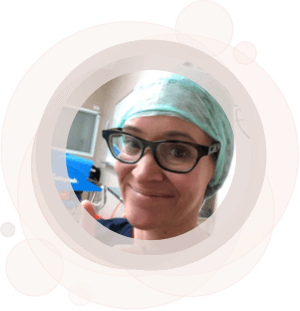Endometriosis treatment in Perth


Gynaecologist in Perth
Let’s start by clarifying what it is. Endometriosis is an inflammatory disorder around the uterus. It is diagnosed when tissue, similar to the lining of your uterus, is found outside the uterus. The condition is linked to your oestrogen levels. Up to 1 in 10 Australian women of reproductive age are diagnosed with endo, mostly before the age of 44.
But when we look at patients who experience a delay in falling pregnant (we call them subfertile patients), an even larger proportion of this group of women have endometriosis. And almost 9 out of 10 women who have chronic pelvic pain, will at some stage get a diagnosis for endometriosis.


So as you first hear your GP or gynaecologist mention that you may have endometriosis: it is important that it is an inflammation around the uterus – which may affect your chances of falling pregnant.
So with this understanding of what the condition actually is, what can you expect from an endometriosis treatment?
First of all, it is important to understand that endo cannot be ‘cured’. When your gynaecologist -and this would be a specialist with experience in laparoscopic gynaecology- talks about endometriosis treatment, we are talking about reducing symptoms, improving your quality of life and the chances of having children.

Perth gynaecologist
Some options for treatment focus on suppressing your ovulation (for example COCP). Other treatments will be based on their progestogenic nature: progesterone reverses endometriosis at a cellular level.
It may be that along the way, your gynaecologist suggests that you have laparoscopic surgery or, a ‘laparoscopy’.
Perth gynaecologist
endometriosis ?
- Pelvic pain
- Period pain - Period pain is the symptom that correlates most strongly with endometriosis.
- Dyspareunia - painful sexual intercourse
- Ovulation pain
- Painful defecation or passing urine
- Premenstrual spotting
- Subfertility
- Fatigue
- Bloating
- Change in bowel habits - constipation / diarrhoea
- IBS-like symptoms
The link between the ‘severity’ of your endometriosis, and the severity of your symptoms, is sometimes confusing. In other words, there is no correlation between the potential signs of endometriosis and the extent of the disease. That in itself means that it is recommended to seek the help of a qualified specialist when you suspect you may have it.

Perth gynaecologist
Understanding the severity of your endometriosis is even more important if you are hoping to fall pregnant. We know that if it is severe, it will affect your reproductive potential or in other words, the likelihood to fall pregnant.
Gynaecologist Perth
and treated?
As said, the condition shows up in a wide variety of appearances and symptoms. The bottom line is that, if you develop painful periods, it may be advised to ask a GP referral, and get checked for endometriosis.
Your gynaecologist will look at a detailed history and perform a clinical examination.
It’s also good to bear in mind that if you have a family history of endometriosis (in a first-degree relative), your chances of developing endometriosis increase by up to 10%.


As said, the condition shows up in a wide variety of appearances and symptoms. The bottom line is that, if you develop painful periods, it may be advised to ask a GP referral, and get checked for endometriosis.
Your gynaecologist will look at a detailed history and perform a clinical examination.
It’s also good to bear in mind that if you have a family history of endometriosis (in a first-degree relative), your chances of developing endometriosis increase by up to 10%.
Until recently, it was believed that the non-invasive methods (avoiding a laparoscopic surgery) were only moderately successful. But ultrasonographers are getting better at detecting and diagnosing endometriosis. The type of imaging they use is a transvaginal pelvic ultrasound scan.
If you are diagnosed with ‘deep endometriosis’, with implants larger than 5 mm, the symptoms would typically also affect your bowel or bladder. In that case, your gynaecologist will ask you to do additional tests (such as an endorectal USS and MRI) to make it easier to plan your surgery.
The ‘gold standard’ procedure to provide a clear diagnosis is a laparoscopic assessment of your pelvis to visualise and excise endometriosis. So in some situations, you may hear that the way to get diagnosed is actually a type of surgery: diagnostic laparoscopy is a surgical diagnostic procedure, it is low-risk and minimally invasive with small incisions. The instrument used by your gynaecologist is a laparoscope and it allows us to look at the lining of your uterus and the surrounding tissue.
Through a laparoscopy, we can do more than just visualise your pelvis and the areas of endometriosis. These areas can also be excised (cut out) or ablated (burned).
Even after the tissue has been removed, it is possible that you still feel pain. This is linked to what we call the hot-wiring of your nervous system. That is why we recommend seeking medical advice from your gynaecologist at Woom, to stop the transition from painful periods to chronic pelvic pain.
Ideally, you would consider laparoscopic surgery in a timely manner. It means that your doctor can then maximise the options for medical treatment, so you can avoid repeat surgical procedures.
At Woom, we use our combined experience to help you with the pelvic exam, planning your laparoscopy or the management of your endometriosis, and even with all other related fertility tests and treatment plans, if that applies to you.
Gynaecologist & fertility specialist in Perth
Endometriosis causes pain at several levels. Firstly, the endo area bleeds each month as the period bleeds. This bleeding into the pelvis causes pain. Bleeding can cause scarring and adhesions which can lead to the ovary being stuck to the sidewall of the uterus. A developing follicle can then cause pressure or pain.
Adenomyosis (the growth of the lining within the wall of the womb) is commonly found with endometriosis and it typically causes your uterus to be enlarged and tender which can exacerbate period pain and pain during intercourse.
And here’s another scenario where endometriosis causes pain: A swollen and blocked tube can occur due to endo and this can cause you to feel pain. In case you experience pain over a prolonged period of time, the levator ani (pelvic floor) can be hypertonic (too tight) and myalgic (sore), similar to you contracting the muscles around your forehead when you have a headache. After a period of time, the muscles stay tight, which can compress blood vessels, nerves and lymphatics and lead to an unhealthy ‘pelvic’ environment.
If you are in pain, our first concern here at Woom women’s health clinic will be to reduce the pain you experience. Long-term management may involve the work of our women’s health physiotherapists, with a focus on strengthening the muscles in your pelvic area.
It is very common to see women who have endometriosis and who end up delaying treatment…because they didn’t get a diagnosis.
Not all women with endometriosis have symptoms. And not all of the symptoms we discussed lead to an endo diagnosis. That is why many women end up confused and have seen multiple doctors before they are finally diagnosed with endometriosis.
Knowing that laparoscopic surgery may be required, not all women explore this option. The average age at first diagnosis is 28 and the average delay in the onset of symptoms and the diagnosis can go up to 12 years.
We believe that the better you understand your body, the easier it becomes to seek help or to make well-informed decisions. Especially if you are planning or hoping to fall pregnant, or if you have come across an overload of information when looking up symptoms online, it’s important to speak to qualified and experienced specialists.
Women with endometriosis can fall pregnant, but if you experience a delay in falling pregnant and your specialist would label that as ‘subfertility’, there is a 40% chance that endometriosis is also one of the underlying conditions that need attention.

Perth gynaecologist
Laparoscopic gynaecology surgeon Perth
Doctors / Experts at woom
to help with endometriosis treatment
and management?

Gynaecologist

Gynaecologist

Dietitian
Specialist Nutrition Programs at Woom
Nutrition and lifestyle management are first-line treatments for reproductive conditions including PCOS, endometriosis and/or sub-fertility

